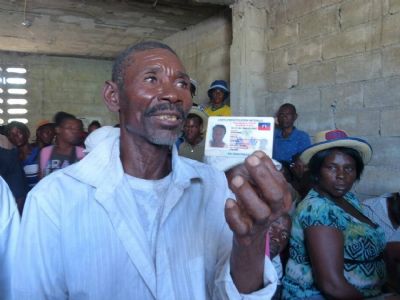"In a suburb a few miles south of Haiti's capital of Port-au-Prince, Vilner Benjamin walks through a concrete maze of unpainted cinder block homes and narrow alleys pointing out the filthy, standing water and the canal that floods with disease-carrying waste whenever it rains.
His cell phone rings nonstop as he makes his way through the neighborhood called Bergamoth, with caller after caller anxiously asking the same question: 'Any news?'
The calls are from Haitian cholera victims who are desperate to know if they'll receive any of the compensation promised by the United Nations after its blue-helmeted peacekeepers infected Haiti's Artibonite River and one of its tributaries with the deadly disease in 2010.
'They are thirsty for information,' says Benjamin, head of ASOVIK'K, the Association of Cholera Victims of Carrefour, which is compiling a list of cholera victims - about 2,700 and growing - in anticipation of U.N. payment.
A treatable but potentially fatal bacterial infection, cholera causes severe diarrhea and vomiting that can lead to dehydration and death in a matter of hours. Unknown in Haiti for at least a century, cholera has afflicted more than 812,000 Haitians, fatally infecting over 9,600 since it was introduced by Nepalese peacekeepers 10 months after the country's Haiti's devastating 2010 earthquake...
The United Nations, which after years of denial finally acknowledged its role in the outbreak in August, has pledged $400 million to treat cholera victims and improve sanitation and water infrastructure in Haiti, while also providing "material assistance and support" to those most severely affected. But it's unclear how long Haitians will have to wait, and if compensation is offered, what it might involve.
A suggestion last month by U.N. Deputy Secretary-General Amina J. Mohammed that $200 million of the money would be used to build 'community projects' has been met with anger and angst in Haiti.
Victims and their advocates view it as a betrayal of the promise made by former U.N. Secretary General Ban Ki-moon who, after offering a long-sought after apology in December for the U.N.'s role, promised the victims would be consulted on any compensation decisions.
Stéphane Dujarric, spokesman for current U.N. Secretary-General António Guterres, offered little clarity on the issue when he was asked about individual payments earlier this month at U.N. headquarters: 'I think we will take one step at a time.'
Brian Concannon Jr., executive director of the Boston-based Institute for Justice and Democracy in Haiti (IJDH), said despite Ban's promise, 'the U.N. has not consulted a single cholera victim about the response, while it is making important decisions.'..."
July 27, 2017
Anger and angst in Haiti as cholera victims wait for UN compensation

A victim of the cholera epidemic caused by UN peacekeepers seeking information on when he will receive compensation
Date
July 27, 2017
Title
Anger and angst in Haiti as cholera victims wait for UN compensation, Miami Herald
Author(s)
Jacqueline Charles
Original Source
